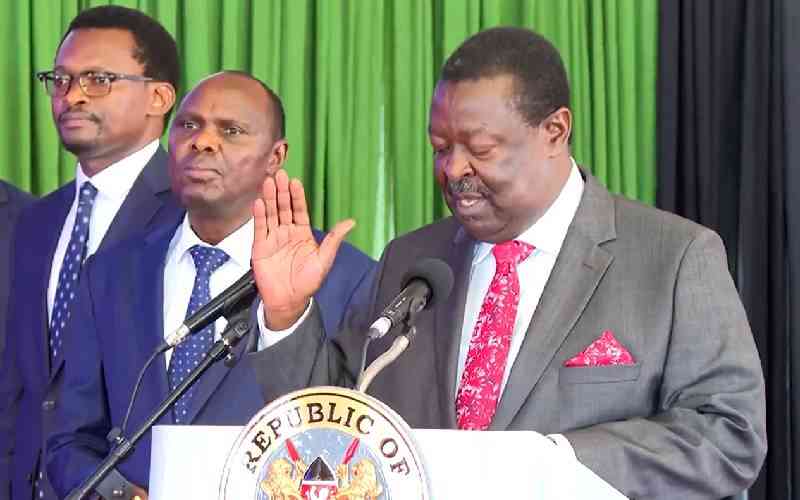
Prime Cabinet Secretary Musalia Mudavadi left Kenyans scratching their heads after not holding up the Bible while taking the oath of office during the swearing-in ceremony of Cabinet members at State House on Thursday.
As it is customary in taking oaths, though optional to denomination, one is needed to lift up the Bible or the Quran as a sign of pledging allegiance to the constitution and serving with diligence.
Mudavadi however did not follow suit, bringing questions to the fore on why he averted the traditional “lift of the Holy book”.
Mwanzo Media established that Mudavadi is of the Quaker denomination, which believes that each individual can experience God without needing a priest or the Bible.
The chief CS has in the past self-confessed to be part of the Quaker faith, which he has professed to use as a guide in administering his role in government.
“Simplicity, Peace, Integrity, Togetherness & Equality are strong Quaker values that I believe can hold us together individually & collectively as a Nation,” he once tweeted.
He echoed the same at a fundraising event in 2016; “We need a religious nation. And for us to get this religious nation, we need a religious president. As you know, Quakers are very religious.”
What is the Quaker religion?
Quakers are people who belong to a historically Protestant Christian set of denominations known formally as the Religious Society of Friends.
The religion started in England in the 17th century by George Fox, following the aftermath of the English Civil War.
Quakers’ key beliefs were formed at this time which included the idea that each individual can experience God without needing a priest or the Bible.
They also preached there was no need for churches, rituals, holy days, or sacraments in order to practice religion and that religion should be something a person lived and acted out every day.
Members of these movements are generally united by a belief in each human’s ability to experience the light within or see “that of God in everyone”. They describe themselves as ‘radical, contemporary, and free-thinking.’
Even though they read and quote the Bible as much as any Protestant, they differ from most Protestants because they do not see the Bible as the primary source of authority. They instead believe that they can have direct access to God through prayer and meditation.
At the onset of the faith, in Fox’s view, the Bible was not the “Word of God” the ultimate authority but simply the words of God.
The Word of God was the living, inward Christ who could be experienced directly without the intermediary of priest or book. Once someone received a genuine religious insight from this Source, he or she usually found it confirmed in the Bible.
Even in the context of taking an oath of office, Quakers believe that an oath with the Bible could add nothing to what they say.
Fox once said when arrested and asked to swear the oath of allegiance: “Our allegiance does not lie in oaths but in truth and faithfulness.”






